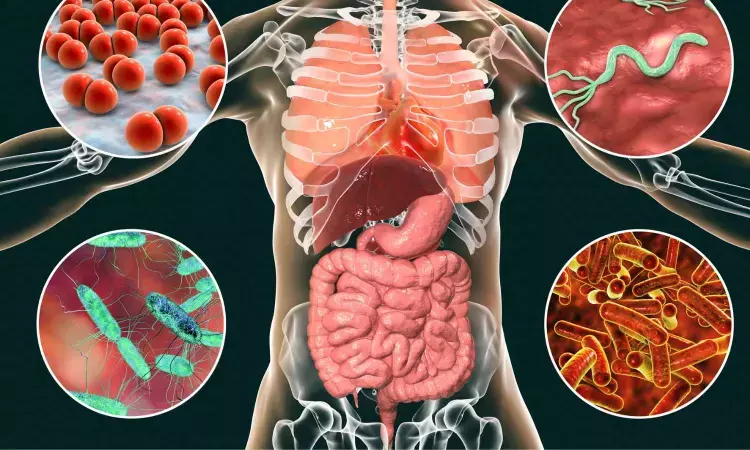- Home
- Medical news & Guidelines
- Anesthesiology
- Cardiology and CTVS
- Critical Care
- Dentistry
- Dermatology
- Diabetes and Endocrinology
- ENT
- Gastroenterology
- Medicine
- Nephrology
- Neurology
- Obstretics-Gynaecology
- Oncology
- Ophthalmology
- Orthopaedics
- Pediatrics-Neonatology
- Psychiatry
- Pulmonology
- Radiology
- Surgery
- Urology
- Laboratory Medicine
- Diet
- Nursing
- Paramedical
- Physiotherapy
- Health news
- Fact Check
- Bone Health Fact Check
- Brain Health Fact Check
- Cancer Related Fact Check
- Child Care Fact Check
- Dental and oral health fact check
- Diabetes and metabolic health fact check
- Diet and Nutrition Fact Check
- Eye and ENT Care Fact Check
- Fitness fact check
- Gut health fact check
- Heart health fact check
- Kidney health fact check
- Medical education fact check
- Men's health fact check
- Respiratory fact check
- Skin and hair care fact check
- Vaccine and Immunization fact check
- Women's health fact check
- AYUSH
- State News
- Andaman and Nicobar Islands
- Andhra Pradesh
- Arunachal Pradesh
- Assam
- Bihar
- Chandigarh
- Chattisgarh
- Dadra and Nagar Haveli
- Daman and Diu
- Delhi
- Goa
- Gujarat
- Haryana
- Himachal Pradesh
- Jammu & Kashmir
- Jharkhand
- Karnataka
- Kerala
- Ladakh
- Lakshadweep
- Madhya Pradesh
- Maharashtra
- Manipur
- Meghalaya
- Mizoram
- Nagaland
- Odisha
- Puducherry
- Punjab
- Rajasthan
- Sikkim
- Tamil Nadu
- Telangana
- Tripura
- Uttar Pradesh
- Uttrakhand
- West Bengal
- Medical Education
- Industry
FDA approves first pill for faecal transplants to prevent recurrent Clostridioides difficile Infection

USA: Vowst (fecal microbiota spores, live-brpk), the first-ever oral live microbiota, has received the US Food and Drug Administration (FDA) approval for the prevention of recurrent Clostridioides difficile infections (rCDI).
“Today’s approval provides patients and healthcare providers a new way to help prevent recurrent C. difficile infection,” said Peter Marks, M.D., Ph.D., director of the FDA’s Center for Biologics Evaluation and Research. “The availability of a faecal microbiota product that can be taken orally is a significant step forward in advancing patient care and accessibility for individuals who have experienced this disease that can be potentially life-threatening.”
It is the first-ever oral live microbiota and the second overall approval in an emerging class of treatments to stop the recurrence of recurrent Clostridioides difficile infections.
“Today’s approval provides patients and healthcare providers a new way to help prevent recurrent C. difficile infection,” said Peter Marks, M.D., Ph.D., director of the FDA’s Center for Biologics Evaluation and Research. “The availability of a fecal microbiota product that can be taken orally is a significant step forward in advancing patient care and accessibility for individuals who have experienced this disease that can be potentially life-threatening.”
CDI, caused by the bacterium C. difficile, is one of the most common healthcare-associated infections in the United States and is associated with 15,000 to 30,000 deaths annually. The human intestinal tract contains millions of microorganisms, often referred to as the “gut flora," or "gut microbiome." Certain situations, such as taking antibiotics to treat an infection, may change the balance of microorganisms in the gut, allowing C. difficile to multiply and release toxins causing diarrhea, abdominal pain and fever, and in some cases, organ failure and death. Other risk factors that can increase the risk of CDI include age over 65 years, hospitalization, nursing home residency, a weakened immune system and/or a previous history of CDI. After recovering from CDI, individuals may get the infection again-often multiple times-a condition known as recurrent CDI. The risk of additional recurrences increases with each infection and treatment options for recurrent CDI are limited. The administration of fecal microbiota is thought to facilitate restoration of the gut flora to prevent further episodes of CDI.
The dosing regimen of Vowst is four capsules taken once a day, orally, for three consecutive days. Vowst contains live bacteria and is manufactured from human fecal matter that has been donated by qualified individuals. Although the donors and donated stool are tested for a panel of transmissible pathogens, Vowst may carry a risk of transmitting infectious agents. It is also possible for Vowst to contain food allergens; the potential for Vowst to cause adverse reactions due to food allergens is unknown.
The safety of Vowst was evaluated in a randomized, double-blind, placebo-controlled, clinical study and an open-label clinical study conducted in the U.S. and Canada. The participants had recurrent CDI, were 48 to 96 hours post-antibacterial treatment and their symptoms were controlled. Across both studies, 346 individuals 18 years of age and older with recurrent CDI received all scheduled doses of Vowst. In an analysis among 90 Vowst recipients, when compared to 92 placebo recipients, the most commonly reported side effects by Vowst recipients, which occurred at a greater frequency than reported by placebo recipients, were abdominal bloating, fatigue, constipation, chills and diarrhea.
The effectiveness of Vowst was evaluated in the randomized, placebo-controlled clinical study in which 89 participants received Vowst and 93 participants received placebo. Through 8 weeks after treatment, CDI recurrence in Vowst-treated participants was lower compared to placebo-treated participants (12.4% compared to 39.8%).
Dr Kamal Kant Kohli-MBBS, DTCD- a chest specialist with more than 30 years of practice and a flair for writing clinical articles, Dr Kamal Kant Kohli joined Medical Dialogues as a Chief Editor of Medical News. Besides writing articles, as an editor, he proofreads and verifies all the medical content published on Medical Dialogues including those coming from journals, studies,medical conferences,guidelines etc. Email: drkohli@medicaldialogues.in. Contact no. 011-43720751


